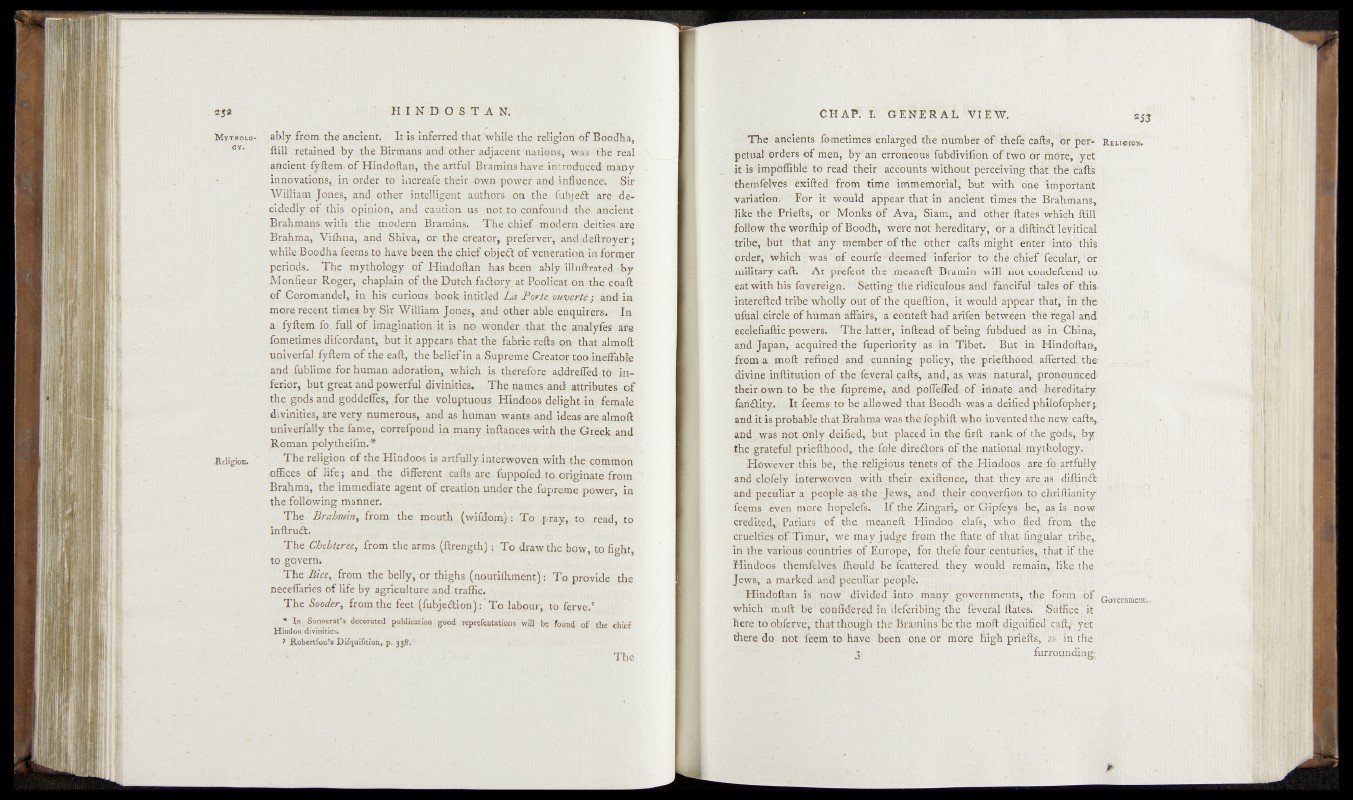
M ytbó:
Religion.
ably from thé ancient. It i&inferre3?that<while the religion of Boodha,
ftill retained by the Birmans and other adjacent nations,1 was' the real
ancient fyftem-of Hindoftan, the artful Bramins have introduced many
innovations, in order to lacreafe.theirownpower and influence* Sir
William Jones, and other intelligent authors -on the fubjeft -are decidedly
of this . opinion, and caution us not to confound the- airgïent
Brahmans: with iHe~ modern Bramins. The chief modern deities are
Brahma, Vifhna, and Shiya, or the creator, preferver, and;déftroyer j
while Boodha feems-to bu*e been the chief objedfc of vengration -in former
periods. The mythology, of Hindoftan has been ably-ftt^ftrated -by
Monfieur Roger, chaplain of the JJuteb faapryvgtT^illicat on thei coaft
of Coromandel,vin his curious book inti tied Porte, pitfVertey, and* ifl
more recent,times by Sir William Jones, and other a|de enquirers* In
a fyftem fo full of imagination it is;-»© wonder,,t^at the analysis are
fometimes difcordant, but it appears that ^he fabric refts on that almost
univerfal fyftem of the eaft, the belief in a Supreme Creator too-ineffable
and fublime for human adoration, which is, therefore addfeffed;to tinr
ferior, hut greatand powerful divinities. The names, and attributes of
the gods and goddeffes, for the voluptuous Hindoos delight-in, female
diyinities, are very numerous, and as human wants and ideas arealmoft
univerfally the fame, correfpond in many inftances with-the Greek and
Roman polytheifm.*
The religion of the Hindoos is artfully interwoven with the common
offices of life; and the different cafts.are fuppofed?to.originate from
Brahma, the immediate agent of creation under the fupreme power, in
the following manner.
The- Brahmin, from the mouth (wiffiomjc Tp pray, to. read to
inftruft.
The Cbebteret, from the .arms (ftrength) ; To draw the bow, to fight,
to govern*
The Bice, from, the belly,, or thighs (npurilhment),: To, provide the
neceffaries of life by agriculture and traffic.
The Sooder, from the. feet (fubjedtion) : "To labour, to ferve.7
* 1“ Sonnerat’s decorated publication good reprefentations will be ’found' of the chief
Hindoo, divinities. 7 Robertfon/f Difqmfition* p. 33.8. ‘
The
The ancients fometimes' enlarged the number óf thefe calls, or per- R eligion.
petual orders of men, by'an erroneousTtibd-ivifib n of two Or móre, yet
itis impoffible to read’their’ a'ccotfnis’without’pèrceivïng that'fhe caffs
themfelves exifted ’from time immemorial, 'but- with"to‘n'e ^ifnpor'tari
variation. For it 'vèöuld appear'that in 'an’cie'iit times fhe Brahmans,
-like the Priefts, of Moilks öf 'Ava' Siam, and ’bther ftates which ftill
followfthd worfhip of Bbodh, were not' heretiitaty,' diftfrnft levitical
tribe, but that any member of the^ bthet'èafts'migflt'^émte^rinto/this
Order, whichwars ’ óf * coiirle -1dfern:ed 'inferior ïo’thè “chief fecular, or
military caft. ’ At prefent-fhe .mêanéft Bra’mln will nrdfcofad'efcend to,
eat with his fdverêign.’ Setting ridiculous and faftfeifuT fates of this
interefted tribe wholly tout? bf the queftion, it would appear thatj ’ in the
ufual circle bf human affairs, a* conteft Ifatf arlfen betweén tftë regal -and.
ecefefiaftic powers; The .latter, inftedd'of tei'ng fuhdued' as in t China,
and Japan, acquired the füperiörity as in Tibet. But itibHindofta»,
from a moft refined andj cunning policy, théfpriefthöod affertedl the-
divine Jnftitution of the feveral cafts, and,las.lwas,/ natural,- pronounced'
their own*to .be the fupreme, and pofte fled of innate and[', hereditary
fanflity. It feems to be allowed'that; B©odh-was a deifiedphilofopherj;
and it improbable that Brahma- was thé föp.hift who. invented the ng^cafts,, -
and was not,Only deified,, but placed in t-he firft rank of-tbe.gods,. by
the grateful priefthood, the Idle directors of the national mythology.' I
However this Be, the religious tenets of^the ,11104098, ^-Jpfarti’uHy
.and clofely interwoven with thgir, exiftetoee, that they iare,$?,jd‘ft™ft
and peculiar a people as the Jews,, and theirpoiwerfiqn to chriftiaffity'
feems ,gven more, hopeleis. If the 2 rfigari, oriGipfey^ he,,"-ifei§li?J-ow
credited, Patiars, of the - mean-eft IJipdoa,.clafs, whoi^jjeef, frpm. the-
cfuèltidsibf ’Timur, Jtiemay judge,frem theftate of that fipgular tribe*
in‘the various.counties of Europe,'* for. thefe four centuries, .’that if the
Hindoos, themfelvës. mould Be Scattered, they would refhain^ like the *■
Jews, a marked and* peculiar people!
Hindoftan is“ now divided into mapy. government^, the fprm bf Government'
which mufr bé'cóniktered' in deferibing fhe mvegaj ftates.' '.'Suffice it
here tó'ohfefvèji that though the Bramins; ué.tnè moft dignifieduaft^ yet
there do not feem to have been; one ör, móre‘ nighprieft’s, ias in the' ’
to _ furxoundingj